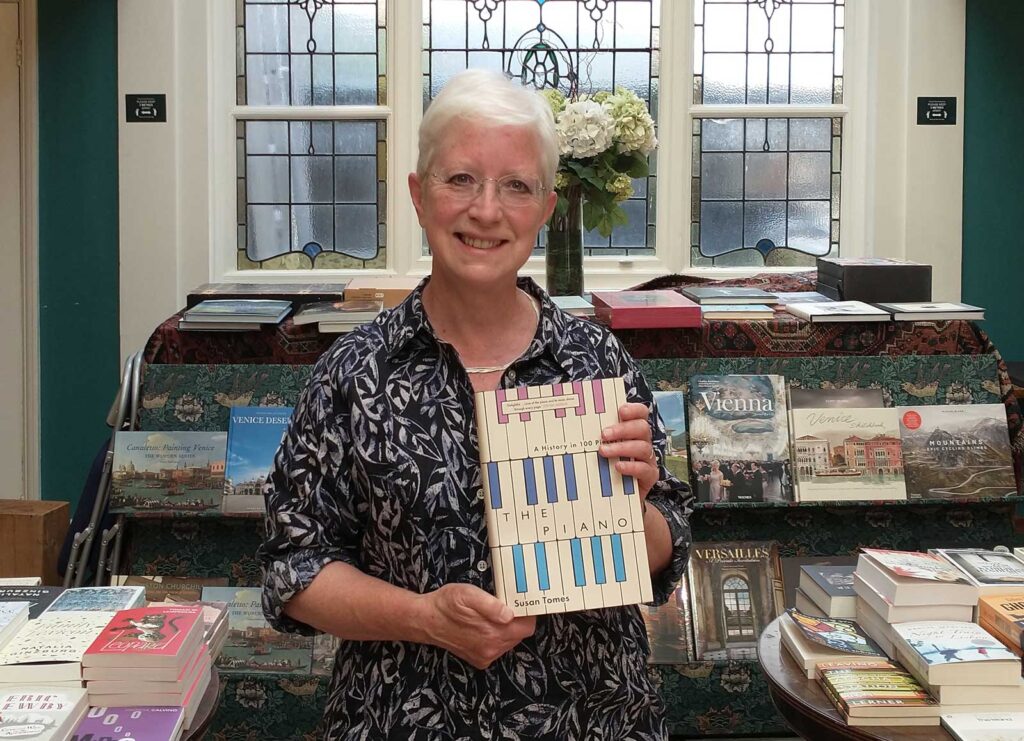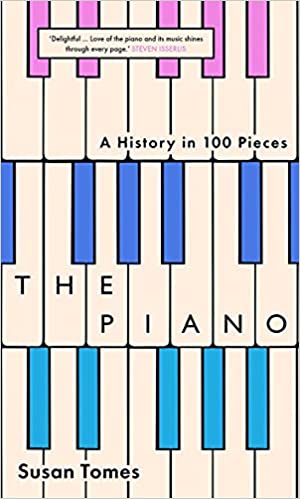New Book: The Piano – A History in 100 Pieces
Pianist Susan Tomes’ praised book “The Piano – A History in 100 Pieces”, charts the development of the piano from the late eighteenth century to the present day. Tomes takes the reader with her on a personal journey through 100 pieces including solo works, chamber music, concertos, and jazz. Her choices include composers such as Bach, Mozart, Beethoven, Robert Schumann, Tchaikovsky, Debussy, Gershwin, and Philip Glass. Looking at this history from a modern performer’s perspective, she acknowledges neglected women composers and players including Fanny Mendelssohn, Maria Szymanowska, Clara Schumann, and Amy Beach. Piano Street talked to Susan Tomes about her book.

Piano Street: There is a multitude of different ways how we perceive history. One solid path is to go chronologically through important events and happenings and subsequently conclude what was to evolve from this. Susan, you are an active – and prize winning – pianist and your book has adopted a performer’s view, reading the map through 100 works, beginning in the late 18th century to today. This is a captivating and rich read touching many areas in music. Can you tell us how you chose these particular pieces?
Susan Tomes: When I was commissioned to write the book I realised I had a chance to include some works which might not be chosen by everyone faced with the task of selecting a hundred pieces to represent the timeline of piano music. A musicologist might have their own reasons for choosing works which seemed significant to them, perhaps for structural or historical reasons; a concerto soloist might focus entirely on solo pieces – of which there are so many wonderful examples! But considering that the piano plays such an important role in collaborative music, I wanted to take a broad approach to its repertoire.
 I have always loved chamber music, and over the years I have come to feel that some composers have given us their best music in the form of chamber music – duos with other instruments, piano duets, piano trios, piano quartets and quintets. There is a quality of intimacy, of give-and-take, of idealistic conversation in this type of music which holds an enduring fascination. So I included lots of chamber music beside the solo works which one would naturally expect to find. Then I wanted to include jazz, which has produced some outstanding pianists and musical thinkers. Overall, my choice is influenced by my own experience of playing, performing, listening and teaching. I admit it’s a kind of ‘insider’s view’, but I also felt it was a golden opportunity to contribute a performer’s choice to the literature. I had to set aside many pieces which would have been interesting to write about – but I also knew that the discipline of keeping to 100 pieces was important. I didn’t want to overwhelm the reader with a tsunami of information!
I have always loved chamber music, and over the years I have come to feel that some composers have given us their best music in the form of chamber music – duos with other instruments, piano duets, piano trios, piano quartets and quintets. There is a quality of intimacy, of give-and-take, of idealistic conversation in this type of music which holds an enduring fascination. So I included lots of chamber music beside the solo works which one would naturally expect to find. Then I wanted to include jazz, which has produced some outstanding pianists and musical thinkers. Overall, my choice is influenced by my own experience of playing, performing, listening and teaching. I admit it’s a kind of ‘insider’s view’, but I also felt it was a golden opportunity to contribute a performer’s choice to the literature. I had to set aside many pieces which would have been interesting to write about – but I also knew that the discipline of keeping to 100 pieces was important. I didn’t want to overwhelm the reader with a tsunami of information!
PS: The piano, with its unique range and tonal colours, is perhaps the most important tool for any composer. Therefor the piano has been destined to sound, or rather imitate other instruments, not least in orchestral thinking and composition. We can think of the piano as a piano but also as an orchestra. How can we elaborate on repertoire with this fact in mind?
ST: When I practise, and also when I teach, I spend a lot of time thinking about and drawing attention to the tone colours of other instruments which one could imagine being involved in the piece – for example, an inner line which would sound just right on the bassoon, staccato notes for the left hand which remind one of a double bass playing pizzicato, or a high melody which would be marvellous in the hands of a skilled violinist. ‘Orchestrating’ a piano piece can be fun and informative.
Not only orchestral instruments are relevant, of course; the human voice often seems to hover nearby as well. There are many piano pieces which seem to suggest opera scenes, with different lines playing different characters. None of this suggests that I find the piano insufficient on its own! I just find that it enlarges one’s conception of sound, colour and texture to imagine the participation of other instruments or voices. These imaginative exercises do affect the way we play.
I think it works the other way around as well: composing at the piano has influenced the way that composers write for orchestra. There are many symphonies (by Brahms, for example) which transcribe very naturally into piano duets and make one realise that their composers probably thought in terms of the piano – or at least were influenced by the way the hands move on the piano – when writing for orchestra.
PS: You are an active performer. How did you cope during the pandemic and what are your plans now when the music scene is opening up again?
ST: I am in my 60s, so obviously I am surrounded by people who have retired, or are planning to do so. However, I never wanted to retire. When I approached my 60th birthday I looked around and realised that I had quite a few colleagues who, for various reasons, had already been forced to stop playing or performing. And I have some close colleagues who are no longer with us. I have been lucky (touch wood!) : I have not experienced problems with my playing. My appetite for music is as good as ever. I somehow felt that I owed it to ‘the gods’ to continue in my profession as long as I was playing well and enjoying it. After all, pianists are well known for keeping going into their old age!
Then the pandemic arrived and all my concerts were cancelled. Like many musicians, I experienced this as a shock and a loss. I felt as if I had been suddenly flung into deep retirement, a feeling I never wanted to have. At the beginning of lockdown I promised myself that I would keep playing the piano every day, so that whenever the pandemic came to an end I would be ready to play in public. I played each day and was glad I had done so when – a year later – I was invited to do some ‘streaming’ concerts and then some live concerts for small audiences. These occasions have provided points of light in the tunnel.
Most classical musicians worry that the pandemic will have a lasting effect on the arts and their audiences. For example, I have many music-loving friends who have not yet ventured back into the concert hall because they worry about the risk of infection. Yet those who have dared to go to concerts have found live music to be a moving experience. Musicians too have found it quite emotional. We can all benefit from learning to experience live music freshly and feeling its health-giving effect. I believe it is still too soon to predict what will happen to the music scene, but I am sure there will be lots of new ideas about how to bring music into the community so that more people can experience it, try it for themselves, and make it a part of their lives.
Resources:
Comments
women composers! and chamber music! this woman truely speaks the truth. so wrong that people neglect the great women composers. it's the patriarchy still dominating our society. i'm so proud of her!!
Glad to hear she is branching out and not just bashing through the old warhorses yet again in her book. God knows classical music needs some fresh air and not just repeating the same popular tunes over and over. It’s good to focus on chamber music and jazz too.
She says “I have not experienced problems with my playing.”. Is this a common thing for pianists?
The warhorses are warhorses for a reason – they’re great music. They deserve to be performed forever and shared to new audiences. Bashing the warhorses highlights an ignorance to the beauty and value of classical music.
My sister had actually gotten me Susan Tomes’ book for Christmas! I loved it so much I read through it once already and I am on my second go now! I was so excited when I heard she released a book and I had no idea I was going to get it on Christmas. It is honestly my favorite gift I received.